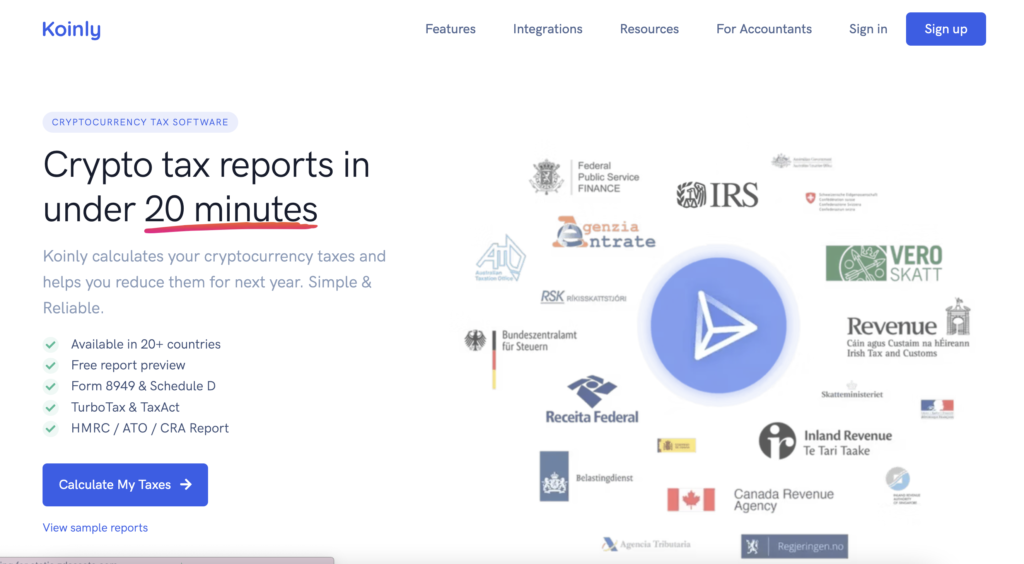As more people plunge into the world of investing in cryptocurrencies like Bitcoin and Ethereum, understanding the tax ramifications of these digital assets is crucial. The Internal RevenueService (IRS) treats cryptocurrencies as property, which means investors must declare their cryptocurrency dealings on their tax filings. Keeping track of your gains and losses, and familiarizing yourself with what exactly triggers a tax liability, can help you navigate the complex landscape of taxes on cryptocurrencies with ease.
Navigating cryptocurrency taxes might seem daunting at first, but it doesn’t have to be. By following guidelines provided by the IRS and utilizing available resources like tax software and crypto exchanges, you can accurately report your cryptocurrency transactions with a headache.
Table of Contents
Key Takeaways
- Cryptocurrencies are taxed as property by the IRS, requiring accurate reporting on tax returns.
- Understanding taxable events and keeping detailed records are crucial for tax compliance.
- Utilize crypto exchanges and tax software to simplify the process of reporting your digital assets.
Understanding Cryptocurrency and Taxes
Cryptocurrencies, like Bitcoin and Ethereum, have gained significant popularity in recent years. As you dive into the world of crypto investments, it’s essential to understand the tax implications that come with it.
Firstly, it’s important to note that the IRS treats cryptocurrency as property, not as currency. This means that you need to report any income you earn or losses you incur from your crypto investments on your taxes. When you buy or sell cryptocurrencies, you trigger a taxable event. For example, if you sold cryptocurrency for a profit, you would report this as a capital gain and pay taxes accordingly. Similarly, if you incur a loss, you can report this for tax deductions, subject to certain rules.
When it comes to paying taxes on your cryptocurrency investments, you’ll need to report any gains or losses on Form 8949. This form helps you calculate your net capital gain or loss, which you will then report on Schedule D of your Form 1040. If you earned crypto as a form of payment for goods or services, you should report it as taxable income on Schedule 1 of your tax return.

How Cryptocurrency is Taxed
When dealing with cryptocurrency on your taxes, it’s crucial to know how the Internal Revenue Service (IRS) views it. The IRS treats cryptocurrency as property, which means that buying, selling, or exchanging it counts as a taxable event and typically results in either capital gain or loss.
Capital Gains and Losses
When you sell or exchange cryptocurrency for a higher price than what you originally paid for it, you have a capital gain. On the other hand, if you sell or exchange it for a lower price than what you originally bought it for, you have a capital loss. Capital gains are categorized as either short-term or long-term depending on how long you have held the cryptocurrency before selling it:
- Short-term capital gain: If you held the cryptocurrency for one year or less.
- Long-term capital gain: If you held the cryptocurrency for more than one year.
Capital gains tax rates vary depending on your taxable income and the length of time you held the cryptocurrency.
Ordinary Income
Income earned from cryptocurrency activities, such as mining and staking, is generally taxed as ordinary income. If you receive cryptocurrency as payment for goods or services, it’s also considered taxable income.
To report your cryptocurrency taxes correctly, first, you’ll need to calculate your crypto gains and losses. Next, complete IRS Form 8949 to document your cryptocurrency transactions. Your totals from Form 8949 should then be included on Form Schedule D. Remember to include any crypto income on your tax return, and finally, complete the rest of your tax return.
Navigating your cryptocurrency taxes may seem daunting, but being well-informed, organized, and understanding your tax obligations will help ensure you remain compliant with the IRS.
Importance of Crypto Exchanges in Tax Reporting
Crypto exchanges play a crucial role in tax reporting for your cryptocurrency transactions. These platforms are responsible for providing you with essential information to accurately report your gains, losses, and income from digital assets on your tax returns.
For instance, leading platforms like Coinbase maintain your transaction records and often facilitate tax reporting by offering you access to necessary documents, such as Form 1099-B. This form contains essential data on your cryptocurrency transactions during the tax year, including cost basis, proceeds, and dates of acquisition and sale.
My Favorite Option: Tax Softwares
When it comes to reporting your cryptocurrency transactions on taxes, using a tax software can make the process significantly easier and more efficient. Tax software, like TurboTax and other crypto tax software, play a crucial role in simplifying the complex calculations and organization needed for accurate tax reporting.
I personally use Koinly to do my crypto taxes, and they make it super easy.
But there are other options, too.
The best software for handling crypto taxes depends on several factors, including your specific needs, the number of transactions you have, the exchanges and platforms you use, your country of residence, and your budget.
- CoinTracker:
- Supported in various countries.
- Integrates with many popular exchanges.
- Automatically tracks your crypto and calculates taxes.
- CryptoTrader.Tax:
- Easy-to-use platform for generating tax reports.
- Supports numerous exchanges.
- Used by many tax professionals.
- Koinly:
- Supports over 300 exchanges and wallets.
- Provides tax reports for many countries.
- Features a clean interface and useful tools.
- TokenTax:
- Supports a wide range of exchanges.
- Offers tax loss harvesting tools.
- Can calculate taxes for many different countries.
- BearTax:
- Integrates with many exchanges.
- Provides consolidated tax documents.
- Offers a straightforward interface.
- ZenLedger:
- Offers a dashboard to track all transactions.
- Supports many exchanges.
- Provides tax loss harvesting tools.
- Accointing:
- Portfolio management and tax tool.
- Supports over 4500 cryptocurrencies.
- Integrates with numerous exchanges.
When choosing a software solution, consider the following factors:
- Integration: Ensure that the software integrates seamlessly with all the exchanges and wallets you use.
- Usability: Choose a software that has a user-friendly interface and provides clear instructions.
- Support: Make sure the platform offers good customer support in case you run into issues.
- Country-specific: Ensure the software supports the tax regulations specific to your country.
- Price: Some software solutions offer free versions with limited features, while others might charge based on the number of transactions.
Lastly, always consult with a tax professional or accountant familiar with cryptocurrency regulations in your country to ensure that you’re complying with all legal requirements.
How To Use Koinly
So let’s say you want to use Koinly. What does the process look like? I’ll break it down:

1. Sign Up & Set Up Your Account:
- Visit the Koinly website and sign up using your email address or other login methods they offer.
- Once registered, log into your account.
2. Select Your Country & Currency:
- Choose your country of residence as this will determine the tax rules applied.
- Select your primary currency for reporting.
3. Integrate Your Wallets & Exchanges:
- Koinly supports a vast number of wallets and exchanges.
- For Exchanges: You can usually integrate them using API keys. This way, Koinly can automatically fetch all your trades and transactions.
- Go to the exchange settings page.
- Generate an API key (ensure that it’s ‘read-only’ for security).
- Enter the API key details in Koinly.
- For Wallets: You can either:
- Connect them using public addresses for read-only access.
- Import CSV/Excel transaction files if you have them.
4. Review Transactions:
- After integrating, Koinly will start importing all your transactions.
- Ensure all transactions are imported. If there are missing transactions, you may need to import them manually.
- Check for any “warnings” Koinly provides. This could be due to missing data or other inconsistencies.
5. Tag Transactions (if needed):
- Koinly will automatically categorize most of your transactions. However, there might be some it can’t categorize.
- You can manually tag transactions as gifts, donations, mining income, etc., based on your specific situation.
6. Review Your Capital Gains:
- Koinly will automatically calculate your capital gains using the data provided.
- You can view a summary of your gains/losses on the dashboard.
- The software uses the specific tax rules of the country you selected to calculate these gains.
7. Tax Loss Harvesting (optional):
- Koinly offers tools that can identify potential opportunities for tax loss harvesting.
- If you have unsold assets in a loss position, you might consider selling them to offset other gains.
8. Generate Tax Reports:
- Once you’re satisfied that all data is accurate, proceed to generate your tax report.
- Koinly will provide a detailed breakdown suitable for your country’s tax regulations.
- Different countries might have different report types, so ensure you’re downloading the correct one for your needs.
9. Consult a Tax Professional (recommended):
- While Koinly provides a comprehensive tax calculation, it’s always a good idea to consult with a tax professional familiar with cryptocurrency to ensure everything is accurate and you’re fully compliant.
10. File Your Taxes:
- Use the tax report generated by Koinly as a guide to complete your tax return.
- If you’re using tax filing software, some versions may allow you to directly import data from Koinly or enter it manually.
Remember to regularly update Koinly with new transactions, especially during tax season, to keep everything in order. And always ensure that your data is complete and accurate to avoid issues with tax authorities.
Tax Implications of Mining and Staking
When you mine or stake cryptocurrency, it’s essential to understand the tax implications, as the Internal Revenue Service (IRS) treats digital assets as property. This means you need to report your mining and staking activities on your tax return.
For mining, the cryptocurrency you acquire through this process will be taxed as ordinary income. You’ll owe tax on the entire value of the coins you mine based on the fair market value at the time you received them. Simply put, the tax rate applied to your mining income will be your regular income tax rate.
Staking also has tax implications, as the IRS has released guidance stating that staking rewards are considered income at the time of receipt. You’ll be taxed on the value of your coins at the time you earned them, using your regular income tax rate.
It’s important to note that if you are engaged in mining or staking activities as a self-employed individual or as part of a trade or business, you may also be subject to self-employment tax. Self-employment tax is a separate tax that covers Social Security and Medicare contributions for individuals who work for themselves.
When it comes to reporting your mining and staking activities, you must keep detailed records, such as dates, fair market values, and the types of cryptocurrencies involved. It’s crucial to track these details to accurately report your taxable income on your tax return.
To sum it up, when engaging in cryptocurrency mining or staking, be aware of the tax implications, and ensure you accurately report your income and pay the required taxes. By staying informed and diligent, you can effectively navigate the complexities of the tax system while participating in the world of digital assets.

Special Considerations: Donations, Theft, and Casualty Loss
When dealing with cryptocurrencies on your taxes, it’s crucial to be aware of special considerations such as donations, theft, and casualty loss. This section will address these issues and provide guidance on how to handle them when filing your taxes.
Donations: Donating cryptocurrency to a qualified charitable organization can result in a tax deduction. Generally, you can claim the fair market value of the donated crypto as a charitable contribution on your tax return. Remember to keep records of your donations and obtain proper documentation from the receiving charity.
Theft loss: In some cases, you may be able to claim a tax deduction for stolen cryptocurrencies. However, for tax years 2018 through 2025, individuals can only deduct casualty and theft losses if the losses are attributable to a federally declared disaster.
Casualty loss: Casualty losses related to cryptocurrencies can be more complex. Just like theft loss, you can only claim a deduction if the loss is caused by a federally declared disaster. Ensure that you keep accurate records of your transactions and inform the relevant authorities of the event causing the loss.
By understanding these special considerations and adhering to the necessary requirements, you can accurately report cryptocurrencies on your taxes. Be sure to consult a tax professional or seek further guidance from official sources like the IRS to ensure compliance with the ever-changing regulations regarding cryptocurrencies.
Conclusion | How to Report Cryptocurrency on Taxes
When it comes to reporting cryptocurrency on your taxes, staying organized and thorough is crucial. To ensure accuracy, make sure to keep records of all of your cryptocurrency transactions from the year, across all your wallets and exchanges. This will help you accurately report your capital gains or losses on Form 8949.
One way to simplify the process of reporting crypto transactions on your taxes is by using a dedicated cryptocurrency tax software like Koinly. Tools like these can help you calculate your gains and losses, consolidate your transaction history, and generate necessary tax forms, ultimately streamlining the entire process.
Frequently Asked Questions
How do I report crypto transactions on Form 8949?
To report your cryptocurrency transactions on Form 8949, you will need to list each transaction separately, including the date of acquisition, date of sale, cost basis, and proceeds. Fill in the required information, and if you have both short-term and long-term gains or losses, you’ll need to complete separate sections for each. After completing Form 8949, transfer the totals to Schedule D of your tax return.
Are taxes applicable on Bitcoin if not cashed out?
Yes, taxes can apply on Bitcoin even if you have not cashed out. If you sold, exchanged, or used Bitcoin for goods or services, you may need to report your digital asset activity on your tax return. This includes recognizing capital gains or losses, and paying applicable taxes. However, if you’re simply holding Bitcoin without any transactions, there are no taxes applicable.
Is there a threshold for reporting crypto under $600?
There is currently no de minimis exception for reporting cryptocurrency transactions under $600. This means that even transactions below this threshold need to be reported on your tax return, and capital gains or losses must be calculated and recognized accordingly.
How can I calculate my cryptocurrency taxes?
To calculate your cryptocurrency taxes, first, you need to calculate your crypto gains and losses for each transaction. Take the difference between the fair market value at the time of disposal and the cost basis (purchase price). Keep track of both short-term and long-term gains, as these are taxed differently. After calculating your net gains or losses, report this information on Form 8949, and include the totals on Schedule D of your tax return.
Should I report crypto transactions even if I haven’t sold?
Yes, you should report cryptocurrency transactions even if you haven’t sold the assets. Some transactions, such as exchanging one type of cryptocurrency for another or using cryptocurrency to purchase goods or services, can trigger a taxable event. In these cases, you must report the transactions on your tax return and calculate any capital gains or losses. Be sure to maintain accurate records of your transactions to simplify this reporting process.
- Amazon Email Phishing: How to Identify and Avoid Scams - March 12, 2025
- Malwarebytes vs McAfee: Decoding the Ultimate Antivirus Battle - March 12, 2025
- Best Antivirus for Windows 10: Expert Recommendations for 2023 - March 12, 2025










1 thought on “How to Report Cryptocurrency on Taxes: A Comprehensive Guide”